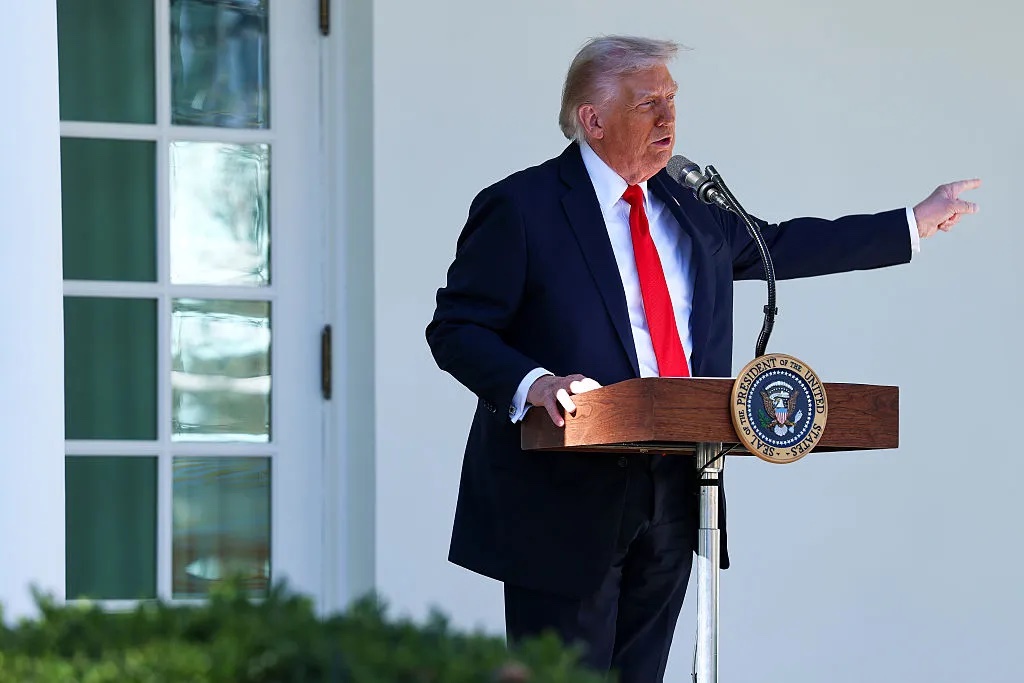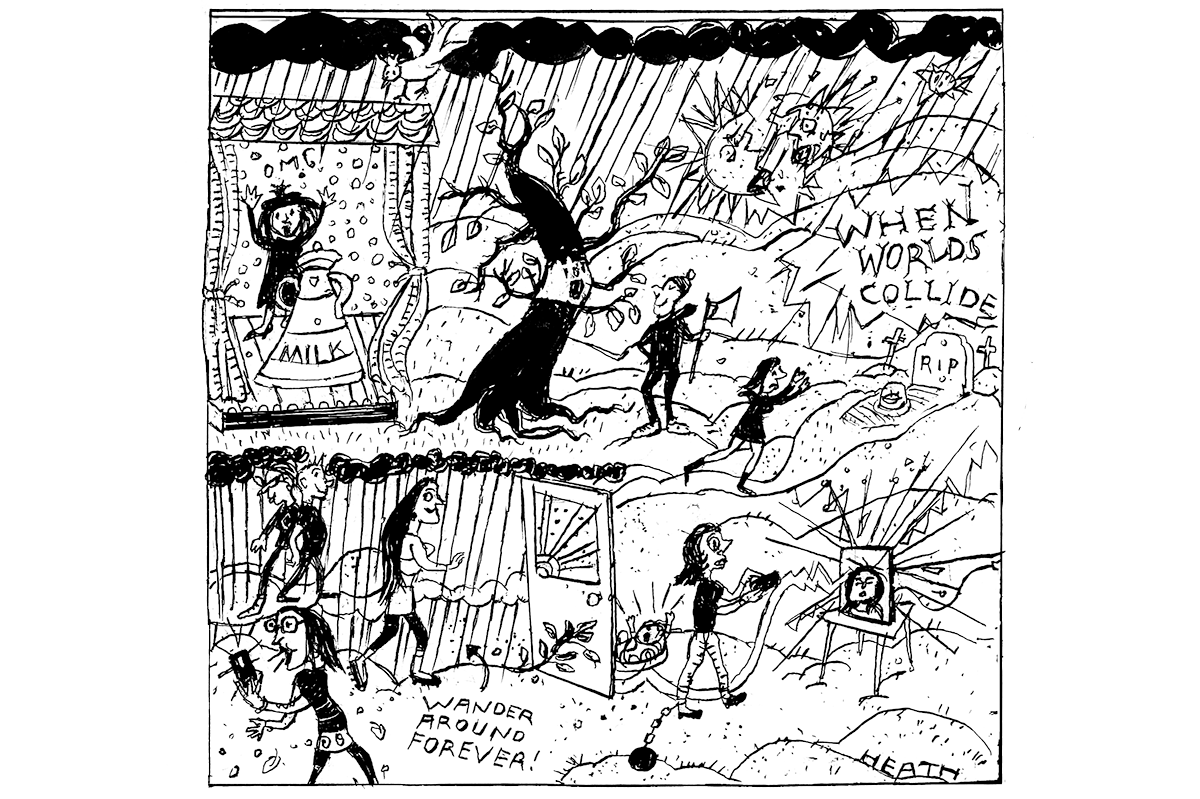QAnon is the online movement spawned by Q, a poster on the anonymous message board 4chan. In October 2017, they began leaving a series of gnomic posts riven with strange imagery – “drops.” Claiming to be a US official with a high-level security clearance, Q informed fellow users that the United States was secretly controlled by a clique of pedophiles and traitors encompassing much of the Democratic party and the intelligence services.
But Donald Trump, who had recently been elected president, was alive to the danger. With the aid of friendly “deep state” elements, Trump was working behind the scenes in a grand effort (“The Plan”) to expose the cabal that would culminate in a day of action (“The Storm”) in which its members would be arrested and executed. Crucial to the success of “The Plan” would be the “Great Awakening,” in which ordinary Americans were made to realize the truth of their situation – hence the propagation of Q memes on social media. A zealous and often harried tribe, QAnon members have been Trump’s most devoted supporters through his ups and downs, the nadir of the 2020 “steal” and his final apotheosis. At the last count, 19 percent of Americans were, to some degree, Q believers.
QAnon lore is a heady combination of Oliver Stone, Alice in Wonderland and the “Book of Revelation.” There are also terrible oaths of violence. But QAnon – as a description of America’s governing class and a foretelling of its downfall at the hands of Trump – has, in a roundabout way, been the best guide to events over the last five years. Like all prophets, Q is oblique and allusive. Some elements are contradictory. Yet each of Q’s core predictions can now be said to have come to pass – sometimes literally, sometimes figuratively. At any rate, it’s been better than any of its rivals at predicting the future. For ten years it has babbled truths that no one else could see.
It turns out, for one, that there really was a faction of the “deep state” ready to mutiny in favor of Trump. Q and its followers always took it for granted that there existed a loyalist element within the country’s elite that was secretly in league with the President and was merely waiting for its moment. The “white hats” in the FBI and the CIA were, they insisted, about to act. Military tribunals were being convened; the malefactors would be purged. General Flynn would march on the Capitol on January 6, 2021, to stop the vote count, sword in hand. “Patriots in control.” Q, in its cryptic “drops,” its whispers in the dark, always presented itself as an Establishment insider, a plausible emissary of this reformist faction.
And didn’t such a faction – in a funny sort of sense – actually exist? In the summer of last year Silicon Valley, the most forward-looking part of the American Establishment, abruptly swung behind Trump. This came as a great shock to many on both left and right who had persuaded themselves that Trumpism was about the losers of globalization against the winners; the countryside against the metropolis; the people against the elites. It did not shock Q, for whom Trumpism was always about a conflict between elites. Only Q, ultimately, called Trump 2.0 correctly: as a revolt by a critical mass of the Establishment who wanted to bring about a change in imperial policy. The new theory of Trump on the American left is of someone helped into power by a rebel faction of the country’s elites. Q had been predicting this for nearly ten years.
Q has made constant reference to secret legions ready to rise in Trump’s name. These are now speedily assembling. In ICE, now Trump wields a MAGA gendarmerie whose annual budget exceeds that of the Brazilian military. As many have noticed, its deployments are not always strictly to do with immigration enforcement. Really it is a Praetorian corps loyal to Trump personally.
The use of irregular units has long been a feature of Trumpism. With the loyalty of the General Staff shaky and the judiciary – apparently – able to relieve him of command of the National Guard, Trump has had to make use of all sorts of expedients in order to exercise the hard powers of the presidency. In summer 2020, with the police and the military refusing to quell the nationwide riots sparked by George Floyd’s death, Trump’s associates had to cobble together what loyal squadrons there were to hand – including border patrol units and federal prison guards – under the Protecting American Communities Task Force. Many observers were taken aback when these obscure formations appeared on the streets, just as they were when Trump, a man of the right, feuded with his generals. They should’ve been reading Q’s drops. The security forces are now visibly divided between those whose allegiance is with the elected President vs the broader Establishment, between “patriot” and “traitor”. That Trump would be driven to act as something of a warlord amid competing power centers. These are things only really explicable under Q’s model of politics.
So too with Washington politics. Who else but this digital army predicted that national life would come to be dominated by a scandal involving elite pedophilia? Child abuse was the centerpiece of Q-ism. It claimed that the sexual victimization of minors – both as a recreation and as an instrument of blackmail – was pervasive at the highest levels. Once this was taken as a symbol of QAnon’s quackery. Now it is the primary attack line of the Democratic party. Q has even been vindicated in the particulars. It always insisted that Trump was one of the few people who wasn’t in on the conspiracy – that he never traveled to the private vice island of Little St. James, and that he distanced himself from Jeffrey Epstein earlier than most. Former US attorney general Bill Barr has now confirmed this version of events. The new tranche of (partially redacted) Epstein emails made no mention of Virginia Giuffre, who denied that Trump was involved. The Trump administration has since dithered over releasing the “Epstein files,” but even this can plausibly be put down to Establishment machinations.
A request by the White House to unseal testimony relating to Epstein, given to a grand jury, was rejected, and many blameless members of the social elite fear guilt by association should their names appear somewhere on one of the purported documents. That there was nothing suspicious about Epstein’s death, or that the conspiracy was real and Trump was as guilty as the rest – both of these views are falling into disrepute. Events have shown Q to be nearer the mark. Once again, its followers seemed to have been gifted with a strange sort of prescience.
QAnon adherents have also consistently been the best judge of Trump’s character. Despite his outward bonhomie, we were always assured by Q that Trump was a man of wrath and cunning, plotting the downfall of his enemies. In 2020, a Q devotee posted a photoshopped image of a smiling Trump playing a violin on X, with the caption “My next piece is called: Nothing can stop what is coming.” The man himself responded. “Who knows what this means, but it sounds good to me!” A wink?

After he left office in 2021, there was an attempt by society to make Trump part of the furniture. More was made of his old zingers, his odd diction. Shorn of his radical program, Trump could be welcomed back into the fold as a zany side character from The Sopranos or something out of the Coen brothers. According to Michael Wolff’s new book, All or Nothing, there was even talk of not pursuing him legally if he decided against running for president again. But society had sorely misjudged its quarry.
Last year, Trump reclaimed the White House on an explicit platform of vengeance against his enemies. He was not in it to promote his brand; he was not in it for the money; he was not an amiable blunderer; he was not a lovable rogue – he was a figure of Nietzschean or even Miltonian proportions. Only Q ever really grasped that from the moment he descended the golden escalator, Trump had, in some way, made an appointment with history which he could not shirk.
Add to this a series of miraculous escapes from danger. A slight turn of the head saved Trump’s life at Butler, Pennsylvania, when he was shot at in July 2024. The final months of that year’s campaign played out like a Pink Panther-style farce, featuring a series of increasingly bizarre and futile assassination attempts: by shooting him dead on a golf course or, allegedly, by poisoning him with gas. Trump emerged unscathed, each time. So too with the January 6, 2021 insurrection – the day QAnon broke the fourth wall on a grand scale. Many participants found themselves locked away in the deepest prisons. Now, in a stunning reversal of the verdicts of 2020-21, the January 6’ers have a lower incarceration rate than the BLM rioters. Some providential force really did seem to be acting on MAGA’s behalf.
The list of Q’s predictions goes on. That lockdown was probably folly. That Joe Biden was senile and a fig leaf for others. That vaccine mandates were unjust. That underhanded and heavy-handed methods were used to sink Trump. That Covid-19 almost certainly gestated in a Chinese laboratory. That there were unsavory things on Hunter Biden’s laptop. Trump’s second term was, according to conventional wisdom, going to involve a final showdown between the “left behind” of the heartland and the coastal elites. It has instead been about purges of the bureaucracy and the deployment of paramilitaries onto the streets amid a national crisis about child sex abuse.
Throughout the past ten years Q has, in a quite objective sense, been good at predicting the course of events. It was certainly more accurate than, say, the idea that suburban GOP women would defect to the Harris-Walz ticket en masse. Or that an endorsement from Taylor Swift would end the presidential race. Almost everything that has happened since 2020 has served to vindicate the enchanted and conspiratorial worldview. All sorts of strange events were taking place; lurid and bizarre things were coming to light for reasons no one could guess. Well, almost no one.
And for all this, QAnon is not a cult. Its followers have shown a much greater willingness to disobey instruction than, for example, those who lie prone and raving before Rachel Maddow. They refused Trump’s Covid vaccine.
Nor was it even especially strange. Every classical republic has seen something like QAnon. Popular self-rule has always required an unreasoning, slightly lunatic faith in what can be achieved together – to overthrow tyranny, real or imagined and, more often than not, to make war on the entire world. “The best is yet to come,” as Q has often said. The average American patriot in 1776 thought that George III was a secret Catholic and probably the Antichrist. Romans of the early republic saw conspiracies everywhere – to bring back the line of kings, to open the city gates to the Sabines or to the Etruscans. The Parisian mob in the 1780s thought the nobles were plotting to starve them and then massacre them with Swiss mercenaries.
“Where we go one, we go all” has been one of QAnon’s most common refrains. One might have heard something similar from Cromwell’s Ironsides. Or during the cannonade at Valmy. QAnon is simply popular sovereignty – a force never really seen before in America. Observed in theory, it has in practice always been mediated by a rigmarole of republican institutions, courts, checks, balances, “civility,” windbags like Walter Cronkite. Trump was the first person since 1945 to go over all their heads and appeal directly to “The People,” and it is with QAnon that the people arrive for the first time as a factor in American history. That “The People” are a minority is of no moment. Nothing like a majority ever wanted to strike off Louis XVI’s head, or probably even to drive out Tarquin the Proud, Rome’s last king.
Trump is a curious vessel. But then such vessels always are. “I had a good life before I did this… I had a hell of a life… I could’ve been sunbathing on the beach,” Trump recently said, ruefully. Some force seemed to be acting through him, quite against his own wishes.
In retrospect, after the miraculous escape from death in Pennsylvania, the prophecy had already been fulfilled. “The Plan” had succeeded. The outcome of the election, the re-enchantment of the Earth, the filling of the vacant World Throne – all were assured. What followed in the last months of the election – and to an extent ever since – was simply a series of whimsies put on by the Gods for their own amusement. All of them echoed with the laughter of the Fates. The laughter of Q.
This article was originally published in The Spectator’s November 24, 2025 World edition.























Leave a Reply